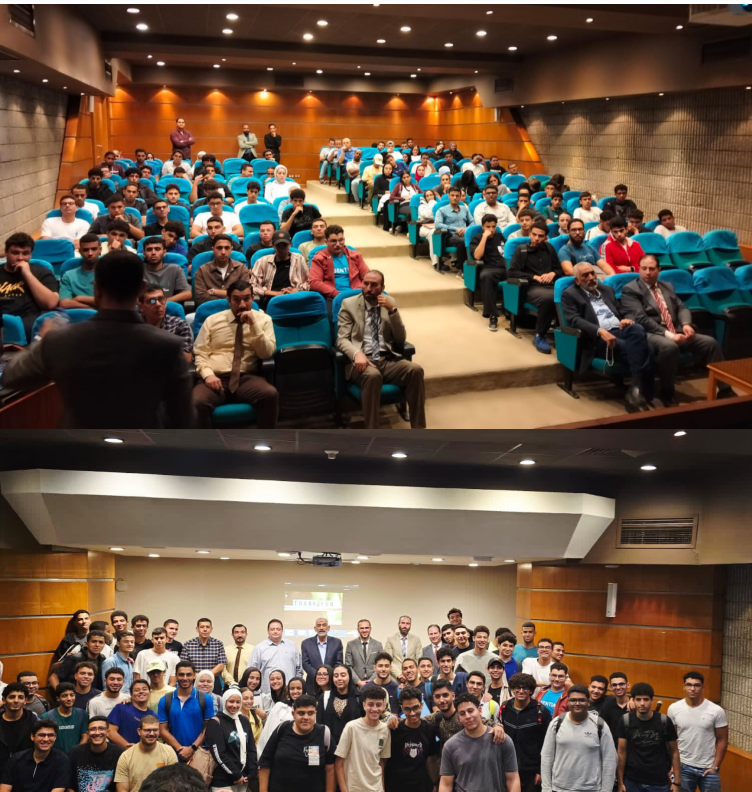
AASTMT's Consumption and Recycling Policy underscores the university's commitment to reducing disposable item usage and fostering sustainable practices across its campuses. Rooted in principles of waste reduction and resource conservation, the policy emphasizes minimizing single-use materials by promoting reusable and eco-friendly alternatives. This approach cultivates a culture of sustainability among students, staff, and faculty, aligning AASTMT’s operations with global environmental standards. Beyond internal practices, AASTMT extends these sustainability efforts to subcontractors and vendors, requiring them to adhere to the same consumption and recycling policies. By holding external partners accountable to its environmental standards, AASTMT establishes a unified and collaborative approach to waste management, reinforcing its leadership in sustainability and ensuring resource conservation for future generations. The following policies are indicating the main role AASTMT in reducing the amount of disposal items, it indicated at point number 2 under title scope, moreover, point number three under title “aims of the policy”, and Disposal under point number 4.
1.Introduction
AASTMT recognizes the growing global challenges arising from the excessive pressure on natural resources, escalating greenhouse gas emissions, rising sea levels, pollution, and inefficient waste management. These environmental issues threaten both present and future generations, underscoring the urgent need for responsible consumption and effective recycling practices. In alignment with its Environmental Change and Social Responsibility Policy, AASTMT is committed to advancing the Sustainable Development Goals by promoting a culture of sustainability across all its campuses and operations. The Consumption and Recycling Policy reflects this commitment by emphasizing waste reduction, resource efficiency, and responsible material use.
Through this policy, AASTMT aims to minimize environmental impact by prioritizing waste prevention, reusing materials whenever possible, and ensuring proper recycling and disposal in compliance with environmental regulations. By fostering awareness and sustainable habits within its community, the University seeks to create a cleaner, safer, and more resilient environment for future generations.
2.Scope
This policy applies to all AASTMT employees, students, and contractors who are involved in handling, managing, or storing any form of waste, including hazardous and non-hazardous materials. It establishes the framework for ensuring that all waste management activities prioritize recycling, reuse, and responsible disposal in line with the university’s sustainability objectives.
Recycling must be integrated at every stage of the waste management process—beginning with proper segregation and collection, followed by safe processing and reuse wherever feasible. A designated responsible person or unit shall oversee the recycling and disposal of materials to ensure compliance with environmental standards and the adoption of the most sustainable methods available.
By embedding recycling practices into daily operations, this policy aims to minimize environmental impact, promote resource efficiency, and support AASTMT’s broader commitment to sustainable development and environmental stewardship.
3.Aims of the Policy
The AASTMT policy considers end-of-life disposal costs and environmental impacts when making acquisition decisions involving the construction of new or renovated facilities.
AASTMT receives the 'waste order' of Prevention, reuse, reusing, and other recuperation and removal. AASTMT executes cycles, methods, and activities that guarantee consistency with ecological enactment and best practice, to lessen the general waste produced and forestall waste creation at every possible opportunity. Moreover, AASTMT is committed to measuring and weighing the amount of waste generated to track the waste and to find the best methods to reduce or recycle it.
4.Procedures
The Waste Treatment Progressive System and Stages Incorporates:
Prevention
RE-USE
Recycle
Disposal
Ethical Sourcing of Food and Supplies
AASTMT is seeking to reduce food waste as much as we can through using food preservation methods and vermicomposting practices. The university is committed to delivering healthy food for all parties in the university including food on Campus, Residences, and employees whether vegetarian or others. AASTMT makes sure that the food is available at each level to guarantee healthy food for ASTMT’s stakeholders. However, food waste is still a problem for AASTMT. Therefore, AASTMT is applying the following procedures to use the waste of food in an appropriate way:
5.Policy Statement
The AASTMT seeks to implement ethical and sustainable practices on all of its campuses. Therefore, the AASTMT has taken crucial measures to implement these practices, such as ecological practices and corporate social responsibility. Through the exchange of information within the Academy's supply chain, these food ethics and practices enable AASTMT to ensure the transparency of information about all suppliers.
To accomplish supply chain transparency, one of the primary goals of AASTMT is to identify the most reliable and reputable partners who share the same ethical practices, objectives, and data. To accomplish ethical and sustainable practices, the first step is to identify the most suitable suppliers.
The interaction with suppliers is the second step to keep secure relationships between partners and to reduce the risk. AASTMT is seeking to build a platform and application to increase communication and share important information. That would give the suppliers and partners access to the internal systems they need based on their roles within the ecosystem, sustainability practices, and the food ethics of AASTMT.
Through utilizing new technologies such as block chain technology, AASTMT plays a crucial role in facilitating the monitoring and tracing of the origin of food. It allows the AASTMT to trace the origin of food and ensure its safe delivery to campuses.
AASTMT is monitoring the overall processes between its partners to guarantee healthy and sustainable food for students, staff, and Residents. Based on this monitoring, errors must be fixed, and corrective action must be taken.
AASTMT guarantees that we are conforming to guidelines, enactment, and best practices to limit the danger of prompt and future contamination or mischief to wellbeing when completing operational exercises.
6.Actions
7.Objectives:
Waste ought to be forestalled or limited at every possible opportunity. AASTMT empowers staff, Students, and employers to limit plastic and cartoon waste, in addition to increasing the awareness about the method to minimize disposable items.
8.Review Program
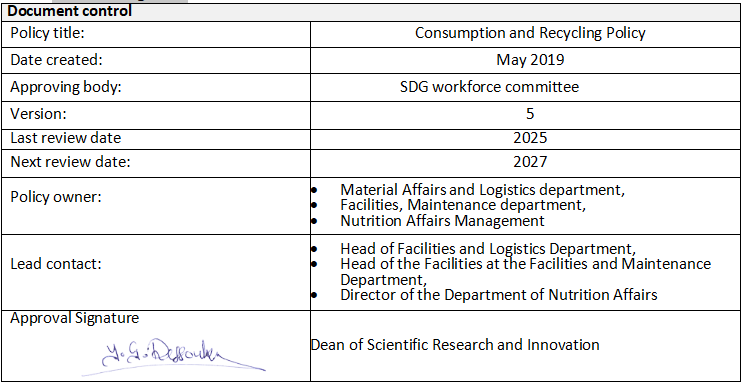
You can read our Consumption and Recycling Policy on AASTMT website.
More activities are applied and practiced in the AASTMT.
AASTMT Hosts High-Level Workshop on Waste Management with Ministerial and International Participation
The Arab Academy for Science, Technology and Maritime Transport (AASTMT) hosted a high-level workshop on waste management at its Alexandria Campus, in partnership with the Alexandria Governorate, Nahdet Misr Company, and the German Retech Foundation, under the patronage of Egypt’s Ministry of Environment and the Waste Management Regulatory Authority. The event brought together ministers, governors, and international experts, including Dr. Manal Awad, Minister of Local Development, and Dr. Yasmine Fouad, Minister of Environment, along with representatives from Egyptian and German institutions. Opening the workshop, Dr. Ismail Abdel Ghaffar Ismail Farag, President of AASTMT, emphasized the importance of sustainable waste management for environmental protection and resource productivity. The discussions focused on innovative approaches and international best practices in waste reduction, recycling, reuse, and safe disposal, reinforcing AASTMT’s role as a leading platform for collaboration in environmental sustainability.
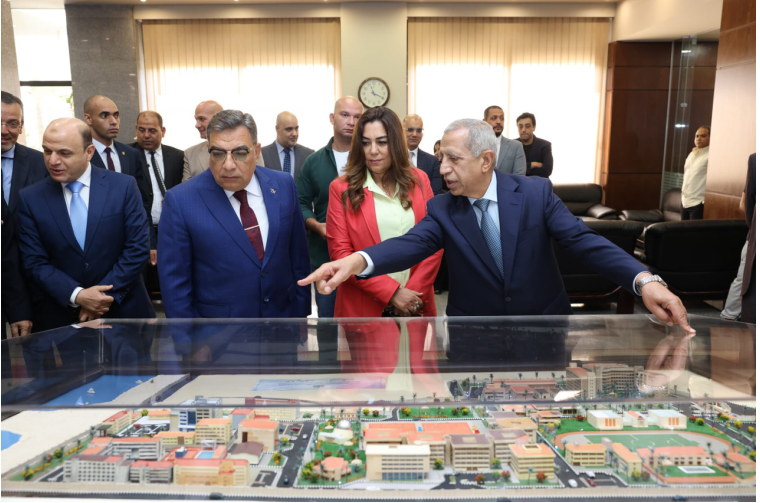
AASTMT Organizes International Waste Management Workshop
AASTMT Alexandria Students Innovate Smart Waste Compactor and Multi-Task Agricultural Robot
Students from the Arab Academy for Science, Technology and Maritime Transport (AASTMT), Alexandria Campus have showcased groundbreaking graduation projects that mark a significant leap in environmental innovation, smart agriculture, and clean energy. Among the highlights are two pioneering designs: the “Smart Solar Waste Compactor,” a fully solar-powered device that compresses plastic waste and promotes circular economy practices by allowing users to redeem the compressed waste for monetary value, and the “LiDAR Navigation IoT Solar Agribot,” a solar-powered, AI-driven agricultural robot capable of irrigation, planting, harvesting, and pest control with precision. Supported by AASTMT and entrepreneur Ahmed Abou Hashima, these projects exemplify the Academy’s commitment to empowering students to transform theoretical knowledge into practical, sustainable solutions that advance innovation and serve the community.
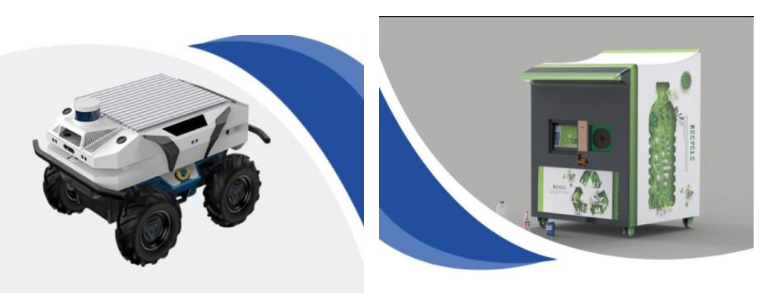
AASTMT Students Develop Smart Waste and Agri-Tech Solutions
AASTMT Signs Cooperation Protocol with the General Authority for Healthcare Accreditation and Regulation to Develop Qualified Medical Professionals
The Arab Academy for Science, Technology and Maritime Transport (AASTMT) has signed a cooperation protocol with the General Authority for Healthcare Accreditation and Regulation (GAHAR) to train and graduate qualified medical professionals capable of preparing healthcare facilities for national accreditation. The agreement, signed at AASTMT’s Abu Qir Main Campus by Dr. Ismail Abdel Ghaffar Ismail Farag, President of AASTMT, and Dr. Ashraf Ismail, President of GAHAR, aims to enhance the quality and safety of healthcare services in alignment with Egypt’s Vision 2030. Through this partnership, AASTMT will provide comprehensive theoretical and practical training programs to build the capacity of healthcare workers, enabling them to apply international standards of accreditation and quality management and obtain the Egyptian Certified Accreditation Professional (EGYCAP) qualification.
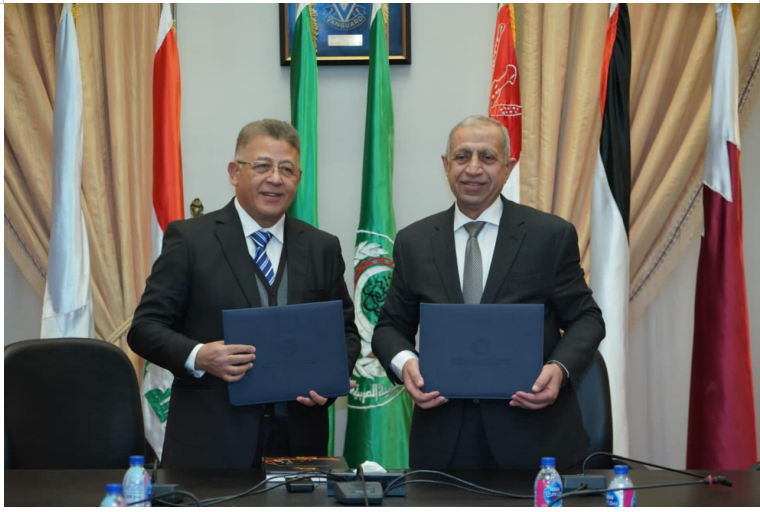
AASTMT Partners with Healthcare Authority for Medical Training
Medical waste disposal procedures within the Arab Academy
The College Of Pharmacy At AASTMT Is Reinforcing Its Commitment To Environmental Safety With A Waste Disposal Initiative In Its Laboratories. Liquid Chemical Waste Is Collected In Designated Bottles Within Each Lab And Then Transferred To Larger Containers, While Broken Glass Is Stored In Separate Containers For Safe Disposal. All Waste Is Ultimately Handed Over To Nahdet Misr Company, A Certified Provider, To Ensure Environmentally Responsible Disposal. This Initiative Highlights AASTMT’s Dedication To Maintaining A Safe And Eco-Friendly Campus Environment.
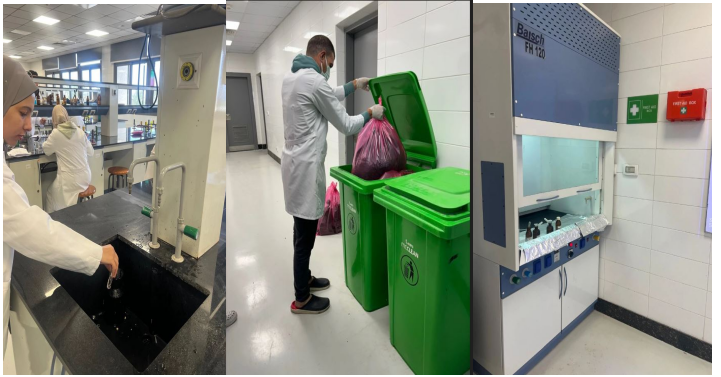
Medical waste disposal procedures within the Arab Academy
AASTMT Abu Qir Campus Hosts Seminar on Recycling Rice Straw into MDF Eco-Boards for Sustainable Urban Development
As part of its efforts to provide students with diverse scientific and cultural experiences, the Arab Academy for Science, Technology and Maritime Transport (AASTMT) – College of Engineering and Technology, Abu Qir Campus, under the leadership of Prof. Akram Suleiman El-Selmy, and through the Institute of Basic and Applied Sciences headed by Prof. Nasser El-Maghraby, organized a scientific seminar titled “Recycling of Straw Wastes to MDF ECO-Boards: Towards an Urban Environment.” The lecture was delivered by Eng. Walid Shafik, Head of Operations at WOTECH Egypt, a company established in partnership with Egypt’s petroleum sector to produce MDF wood panels from rice straw. The session highlighted modern methods for recycling agricultural waste, its environmental and economic benefits, and its role in supporting sustainable development. Students engaged in interactive discussions, gaining valuable insights into the latest technologies transforming agricultural residues into eco-friendly materials, reaffirming AASTMT’s commitment to promoting environmental awareness and innovation among its students.
